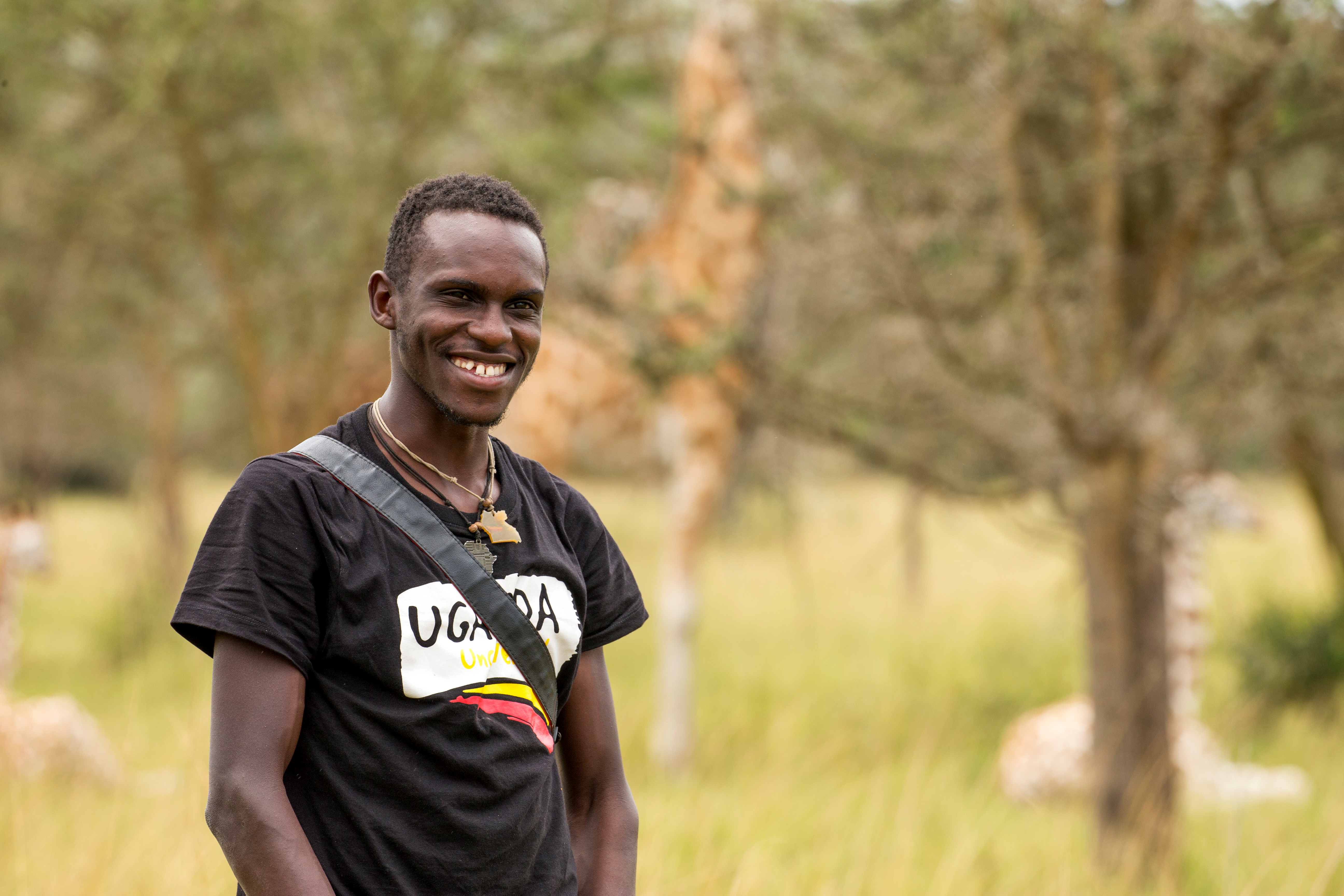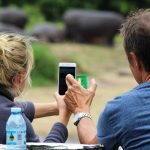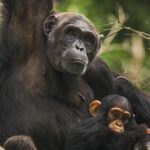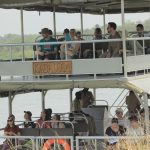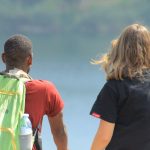RESPONSIBLE GORILLA SAFARIS
As well as using a responsible gorilla watching safari company, which ensures that everything is done to the book, it is important to read up on some of the other issues relating to responsible gorilla safaris. As with many important conservation movements, the protection of people, their lands, their rights and their lifestyles plays a vital role. The people who have been, traditionally, stewards of these lands. And whom we must support through tourism. Read more of our thoughts below.
There are very few wildlife tourism experiences in the world that haven’t created some sort of conflict with local people, or have a history of conflict. And in spite of its incredibly good record of conservation, and exemplary limiting of tourist numbers and time spent with the animals, the gorilla watching industry is still facing issues around displacement of local communities, as well as ongoing poaching driven by poverty and civil strife. It is also important to know that gorillas are still endangered species and, even on responsible gorilla safaris we always pose a threat to gorillas, as we carry in bacteria and diseases. Which is why the ‘Gorilla Rules’ were created by the conservation authorities in Rwanda and Uganda. Just because you have paid a lot of money for your permit to see the godfathers of the forest, doesn’t mean you have a right to do what you like. Rules is rules.
PEOPLE & CULTURE ON GORILLA SAFARIS
The rights of the Batwa
While the number of mountain gorillas is slowly but surely on the rise, ensuring their protection has, sadly, involved some serious maltreatment of people along the way. In particular the Batwa tribe, whose ancestral tribal lands included much of Uganda’s Bwindi Impenetrable and Mgahinga Gorilla National Parks. When the national parks were created in the 1990s to protect the gorillas, the Batwa were evicted and most are still living, many squatting, on the peripheries of the parks, struggling to adjust to new lifestyles or indeed survive. Their displacement was carried out without any consultation or consent of the people, nor with any public hearing. Although a handful of families have been given short land leases, their futures are still hanging in the balance after that. The majority of families have been left without land and, therefore, ways to make a living. A living that was totally sustainable before their evictions, as they had survived for centuries hunting and gathering in the forests.
It was thought that the Batwa killed gorillas for meat, and indeed they are often discriminated against for this reason and blamed for any poaching that occurs. However, the Batwa don’t eat gorilla meat, and have co-existed with them for centuries. Sadly, racial discrimination against the Batwa – a pygmy tribe – is common and now a huge issue.
The irony is that as we tourists ponder the primates, and help fund their survival, the few thousand members of Uganda’s Batwa tribe are in danger of extinction. According to leading human rights organisation Minority Rights International, in 2006 the Uganda Land Alliance for Coalition of Pastoral Civil Society Organizations (COPACSO) produced a report warning of starvation and severe illness among the Batwa people. Modern farming methods and modern medicine are totally alien to their traditions, and the source of both traditional food and medicine has now been taken from them. Not forgetting the devastating impact of having had the ties to their spiritual lands totally cut. The same issues are now arising in Cameroon. Gorilla tourism is growing there, and consequently the Ba’aka people’s ancestral lands have been designated as Boumba Bek, Nki and Lobeke National Parks.
What you can do
Support community tourism activities that support the Batwa , such as the Batwa Trail in Mgahinga Gorilla National Park, where members of the tribe take you on a guided walk through their lands. Which makes for a bizarre and thought provoking experience, given that tourists now have more ease of access to their lands than they do. You can also keep informed and support the work of charities such as Survival International, Minority Rights International and Forest People’s Programme, all of which do incredible work to highlight the plight and human rights of people like the Batwa who are otherwise poorly represented politically, have little access to education and social services, and are hugely marginalised in this new society they were forced to inhabit. Survival International’s recent Parks Need People campaign is particularly prolific right now and definitely a must follow.
ENVIRONMENT & WILDLIFE
Does conservation tourism work?
In general, gorilla tourism is seen as being successful in terms of reducing the amount of poaching and increasing the mountain gorilla populations. According to WWF, as of early 2019, mountain gorillas number over 1,000, up from 780 in 2010. In November 2018 the IUCN downgraded them from Critically Endangered to Endangered.
This has been possible in part because the wildlife authorities of Rwanda, Uganda and Democratic Republic of the Congo have not cashed in on the high demand for gorilla trekking from tourists, but still keep the number of permits available strictly monitored so that the gorillas are exposed to minimal human activity; an hour a day, with no more than eight people in a group. This is impressive compared with other safari onslaughts of jeeps en masse that we witness in other parts of the world, and where wildlife guiding is still all about keeping the client happy. And, indeed, gorilla tourism is often cited as being an exemplary form of wildlife tourism that is a win-win when it comes to conservation and species preservation.
However, with this strict conservation management system comes stringent rules. The gorilla rules. And it is critical that these are adhered to at all times to ensure that we do not harm the gorillas or their habitats by spreading disease and bacteria. You will be briefed on these by your tour operator, but the main ones are as follows:
Do not go gorilla trekking if you think there is any risk of you being ill; even a common cold can be harmful to gorillas
Always wash your hands before your trek
Keep your voice low
Do not touch the gorillas. The guides will ensure that you keep a seven metres distance at all times
Do not eat or drink while you are near the gorillas. This is to avoid morsels of drink or food falling in the gorillas’ habitat, which can then increase the risk of disease transmission
Keep down low and in a submissive state
Do not use flash photography
If you feel the urge to cough or sneeze when you are near the gorillas, turn away and cover your nose and mouth
If you need to do what a bear does best in the woods while on your trek, dig a hole 30cm deep and cover it when you are finished. Your guides will have a spade to dig holes for this purpose
RESPONSIBLE TOURISM TIPS
When you arrive at the gorilla trekking departure point, you will be asked if you would like a porter. There are always more porters than there is work, and many of them will have walked miles to get there just to get a day’s work, men and women, so it is really worth hiring them, even if you don’t really need one. The going rate is about £9-13 but people often tip on top of that as well. Most porters come from local communities, some of whom have a history of poaching gorillas for the sale of bushmeat. So by employing them as porters, we are demonstrating that the gorillas are worth more alive than dead.
Paul Callcutt, from supplier Natural World Safaris:
“The first time I used a porter to carry my daypack, I felt a bit ridiculous getting someone to carry such a small thing, until I started asking questions about why there were so many porters offering their services, and where they had come from, and then I realised that I would feel like a bit of an idiot if I didn’t use one now”.
Rwanda is still recovering from a civil war and genocide in which approximately a million people were murdered in the 1990s. Many lost relatives and friends and today most people still don’t want to discuss it but try to move on. Consequently, be wary of asking someone about their ethnic origin as it is still a very sensitive area. Do take time to visit the memorial sites around the country, however, as well as the Kigali Genocide Memorial Centre.
Homosexuality is illegal in Uganda, and attitudes towards LGBT people are archaically hostile. Although the 2014 Anti-Homosexuality Bill, which proposed life imprisonment for “repeat offenders”, was repealed by the Constitutional Court, homosexuality still comes with a long prison sentence in Uganda.
Habituation is an important part of gorilla conservation, whereby the gorilla families are slowly introduced to human presence over a period of up to two years, before tourists are allowed to see them in larger groups. Some tour operators offer you the chance to take part in a day of habituation with scientists and conservationists, so have a chat with them to see if there are any opportunities available.
The importance of supporting and donating to organisations like WWF is highlighted when you see the successful campaign they led in 2014 to protect the Virunga National Park in the Democratic Republic of the Congo. A haven for gorillas, and one where tourism is in its nascent stage. There had been permits given to oil and gas companies such as Total SA and Soco to investigate the park’s potential for resource exploitation, but massive campaigning and international pressure from conservationists led to both these companies withdrawing.
Respect local people and don’t take photos of them without asking.
You will be using your camera a lot, but in much of Africa it is difficult to dispose of batteries responsibly. So take them home with you or use rechargeables.


